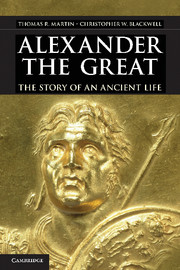Book contents
- Frontmatter
- Contents
- Acknowledgments
- Introduction: The Goal of this Book
- Map 1: European Greece, Macedonia, and Northern Lands
- Map 2: Alexander's Expedition
- 1 The World of Alexander's Birth and His Education in Literature and Warfare (350s and 340s BC)
- 2 Opportunities and Risks asa Teenager (340s to 338 BC)
- 3 The Danger in Replacing a Murdered Father as King (337 to 335 BC)
- 4 The Opening Battles Against the Persian Army (334 to 332 BC)
- 5 Finding God in Egypt and Capturing the Riches of Persia (332 to 330 BC)
- 6 Winning the World as King of Asia (330 to 329 BC)
- 7 Murder, Marriage, and Mixing Customs in Afghanistan (329 to 327 BC)
- 8 Victory and Frustration in India (327 to 326 BC)
- 9 Returning to Babylon and Becoming Divine (326 to 323 BC)
- 10 Remembering and Judging Alexander (323 BC to Now)
- Suggested Readings
- Index
6 - Winning the World as King of Asia (330 to 329 BC)
Published online by Cambridge University Press: 05 November 2012
- Frontmatter
- Contents
- Acknowledgments
- Introduction: The Goal of this Book
- Map 1: European Greece, Macedonia, and Northern Lands
- Map 2: Alexander's Expedition
- 1 The World of Alexander's Birth and His Education in Literature and Warfare (350s and 340s BC)
- 2 Opportunities and Risks asa Teenager (340s to 338 BC)
- 3 The Danger in Replacing a Murdered Father as King (337 to 335 BC)
- 4 The Opening Battles Against the Persian Army (334 to 332 BC)
- 5 Finding God in Egypt and Capturing the Riches of Persia (332 to 330 BC)
- 6 Winning the World as King of Asia (330 to 329 BC)
- 7 Murder, Marriage, and Mixing Customs in Afghanistan (329 to 327 BC)
- 8 Victory and Frustration in India (327 to 326 BC)
- 9 Returning to Babylon and Becoming Divine (326 to 323 BC)
- 10 Remembering and Judging Alexander (323 BC to Now)
- Suggested Readings
- Index
Summary
By early 330 Alexander had sent the Great King of Persia fleeing to the northern corner of his empire. Alexander was master of Egypt and held the Persian capital Persepolis. The treasuries of the empire were his, and his innovative policies of economic reform, (limited) cultural integration, and political stability were going into effect over millions of square miles. The Greeks were avenged many times over for whatever injuries the Persians had inflicted in previous centuries. Alexander's body bore many scars from battlefield surgery to treat missile wounds, and his men were veterans of an unbroken string of victories against fortified cities and armies that invariably outnumbered them. Alexander could have declared victory and settled down to rest and govern amid wealth and comfort, enjoying a well-earned and universally acknowledged reputation as the greatest victor the world had ever seen, a status that his world respected and lauded (as has, for that matter, every other age in human history).
Battlefield Surgery
Doctors performed bloody operations in emergency battlefield conditions to try to save soldiers’ lives; missiles caused the deepest wounds and the most painful operations, as Celsus describes (On Medicine 7.5). Extracting arrows was excruciating if the point at the end of the shaft lodged in a bone. Given that arrowheads often had pointed barbs, pulling an arrow backward out of a wound tore muscle and blood vessels. Therefore, it could be less dangerous to push the arrow all the way through and out the other side. Surgeons used a Y-shaped metal instrument to spread the edges of the wound to make the push or pull easier. If the arrow had to be pulled out backward, then the surgeon could use an instrument called the “spoon of Diocles” after its inventor. This was a smooth metal piece with a small hole at the front end to snag the tip of the arrow and then pull it backward; the sides were turned inward to protect surrounding flesh as the arrow was extracted. If the arrow tip was stuck in a bone, then the doctor could place small reeds around the shaft to smooth its exit and drill holes in the bone around the impact point, to prevent splintering of the bone, which made healing especially difficult. How the patients withstood what must have been the agonizing pain and blood loss of these operations is hard to imagine. If they survived the operation, then infection became a dangerous hazard. It is remarkable that Alexander lived despite often being seriously wounded. Plutarch lists eleven separate injuries that he suffered from arrows, swords, clubs, and rocks (Moralia 327 A-B = On the Fortune of Alexander).
- Type
- Chapter
- Information
- Alexander the GreatThe Story of an Ancient Life, pp. 93 - 112Publisher: Cambridge University PressPrint publication year: 2012



